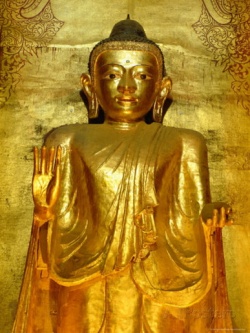Difference between revisions of "Esoterism"
(Redirected page to Vajrayana) |
|||
| Line 1: | Line 1: | ||
| − | + | [[File:Gavjrma.jpg|thumb|250px|]] | |
| + | '''[[Esoterism]]''' is the [[idea]] that some [[spiritual]] teachings should be kept secret from the majority and only be revealed to a select few. The Upaniùads, which were composed around the [[time]] of the [[Buddha]], were [[secret teachings]] only made available to high [[caste]] [[people]] who pledged total loyalty to the [[teacher]]. Even in [[Tibetan]] [[Buddhism]] or [[Vajrayana]], some teachings are reserved only to those who have been initiated. The [[idea]] that the [[Dhamma]] should be restricted to or monopolized by an ‘in-group’ was repugnant to the [[Buddha]]. He [[perceived]] the [[truths]] he taught as being understandable to all, relevant to all and applicable to all. On one occasion he said, ‘''Three things shine openly, not in secret. What three? The orb of the [[moon]], the orb of the {{Wiki|sun}} and the [[Dhamma]] and [[discipline]] taught by the [[Tathàgata]]''’ ([[Anguttara Nikaya]] I. 283). He reiterated this same point just before his final passing when he said; ‘''I have proclaimed the [[Dhamma]] without any [[idea]] of a hidden and open [[teaching]]. I do not have the closed fist of the [[teacher]] who holds anything back''’ ([[Digha Nikaya]] II. 100). | ||
| + | |||
| + | see also: [[Vajrayana]] | ||
| + | {{R}} | ||
| + | [http://www.dhammawiki.com/index.php?title=Esoterism&action=edit www.dhammawiki.com] | ||
| + | [[Category:Esoteric Buddhism]] | ||
Latest revision as of 21:41, 18 March 2014
Esoterism is the idea that some spiritual teachings should be kept secret from the majority and only be revealed to a select few. The Upaniùads, which were composed around the time of the Buddha, were secret teachings only made available to high caste people who pledged total loyalty to the teacher. Even in Tibetan Buddhism or Vajrayana, some teachings are reserved only to those who have been initiated. The idea that the Dhamma should be restricted to or monopolized by an ‘in-group’ was repugnant to the Buddha. He perceived the truths he taught as being understandable to all, relevant to all and applicable to all. On one occasion he said, ‘Three things shine openly, not in secret. What three? The orb of the moon, the orb of the sun and the Dhamma and discipline taught by the Tathàgata’ (Anguttara Nikaya I. 283). He reiterated this same point just before his final passing when he said; ‘I have proclaimed the Dhamma without any idea of a hidden and open teaching. I do not have the closed fist of the teacher who holds anything back’ (Digha Nikaya II. 100).
see also: Vajrayana
